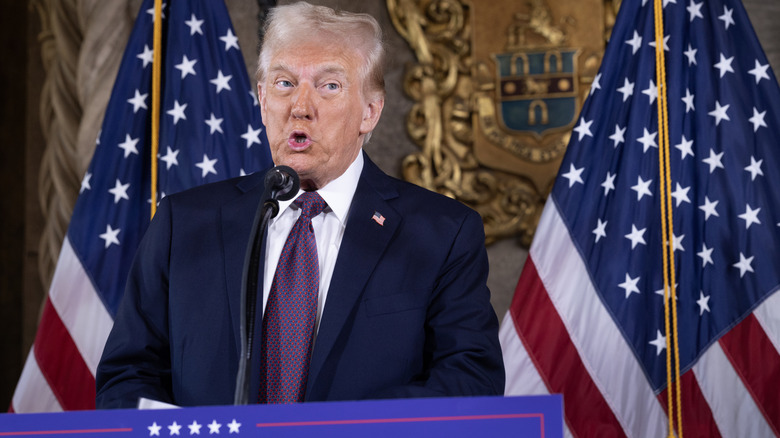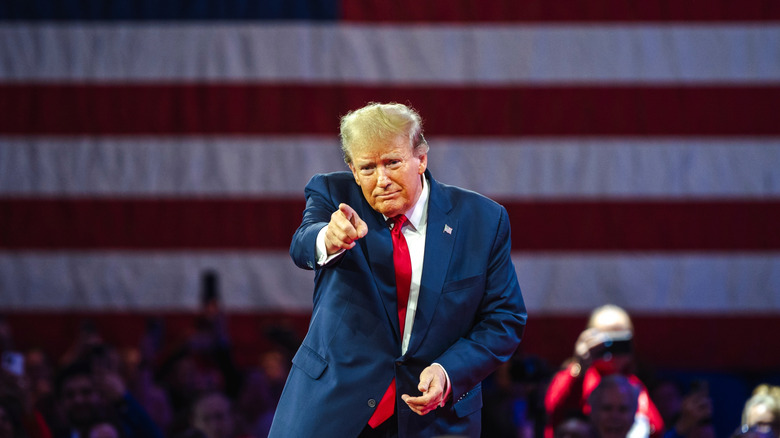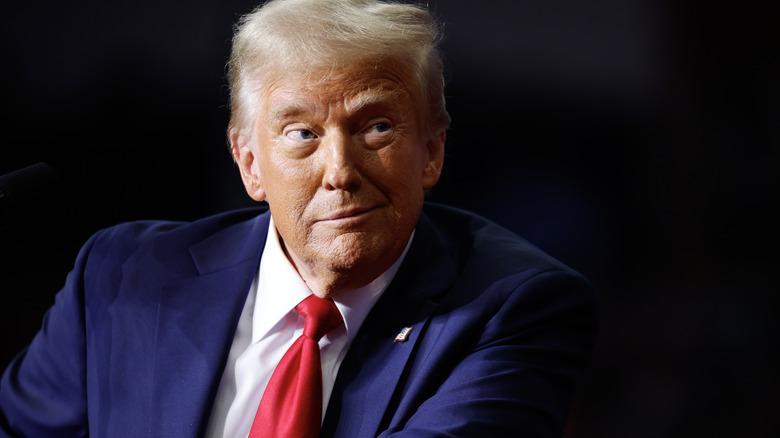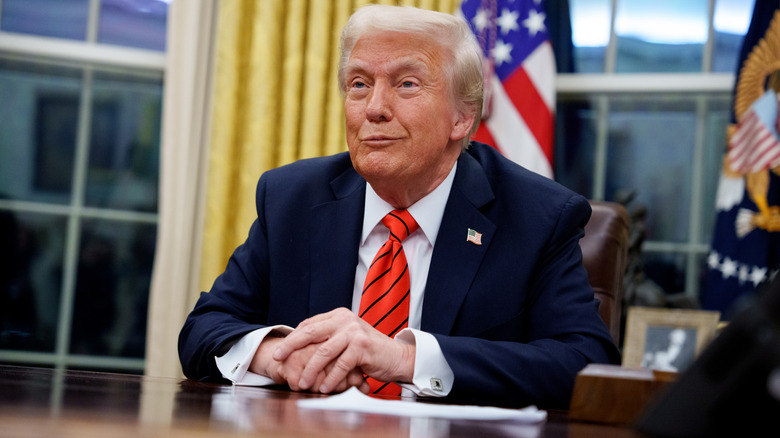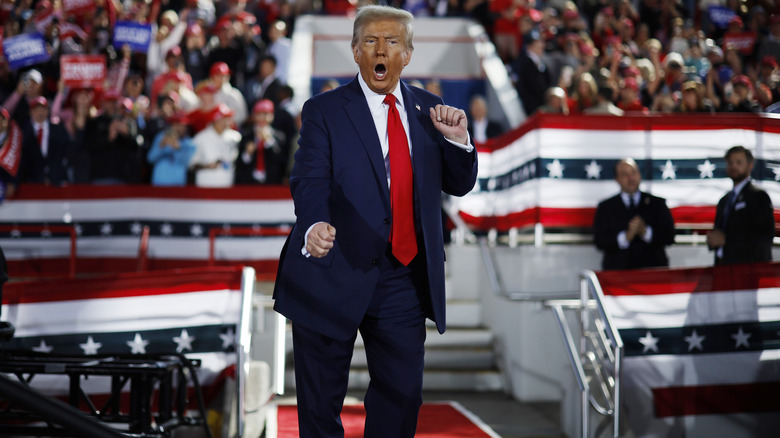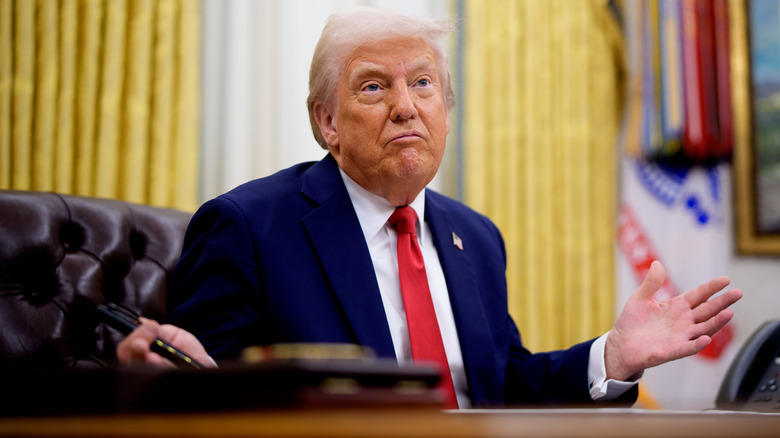Inside Trump's Tumultuous History With TikTok
When it comes to TikTok, President Donald Trump has flip-flopped like only a true politician can. Those who've been keeping up with Trump's tumultuous history with the Chinese-owned app will remember that, during his first term, the president attempted to get TikTok banned in the United States. "We're looking at TikTok, we may be banning TikTok," he told Reuters in August 2020. This obviously made many Americans nervous, especially those who make a living from the app. Questions were raised over whether or not Trump even had the authority to ban TikTok, with many calling it an abuse of power.
"This is an unprecedented use of presidential authority," Eurasia Group analyst Paul Triolo proclaimed to AP News at the time. Funnily enough, banning TikTok was something most Democrats and Republicans agreed on for a change, citing privacy concerns and the dangers of spreading misinformation. Trump claimed he'd give Beijing until September 15, 2020, to sell the app to an American company. Should they fail to do so, he'd shut it down in the States. Obviously, the president never actually managed to make good on these threats. And Trump has since changed his tune about TikTok in a big way.
As the 2024 presidential election loomed, the divisive politician said that, while he still believed the app was a threat to national security, he was no longer keen on banning it because Trump believed that Meta's Facebook platform would benefit from it. The former "Apprentice" host had a bone to pick with Facebook, in part blaming the platform for his 2020 election loss. "Without TikTok, you can make Facebook bigger, and I consider Facebook to be an enemy of the people," he argued to CNBC. Trump's opinion about TikTok has continued to evolve since, and it's been quite the rollercoaster ride.
Trump used to think TikTok was the devil incarnate
President Donald Trump once believed that the Chinese government was exploiting American users' personal information gathered through TikTok, with even Congress sharing concerns that the social media giant could be used to influence the country's elections. In August 2020, Trump signed an executive order as a first step towards potentially banning the app from the States and preventing it from being potentially weaponized by the Chinese government. However, mobile security expert Will Strafach pointed out to AP News that the government lacked any evidence that the app was exploiting Americans' personal information. "We just have not found anything we could call a smoking gun in TikTok," he confirmed.
The court ultimately blocked the president's attempt to ban the app in December 2020 after TikTok retaliated and filed a lawsuit, asserting that doing so would be in breach of Americans' right to free speech. Some thought the crackdown on the app was a petty move from the Trump administration as part of its ongoing attempts to minimize China's influence in the U.S. In early 2024, the controversial politician showed signs of softening his stance, telling CNBC, "There's a lot of good and there's a lot of bad [...] If China wants anything from [TikTok], they will give it, so that's a national security risk [that] goes up."
Trump joined TikTok himself in 2024
Despite his concerns about TikTok taking advantage of citizens' data, Donald Trump created a TikTok account of his own in 2024. This came after the Biden administration's continued efforts to limit use of the app by banning it on government-issued phones. In his first video posted to the platform, Trump said that it was "an honor" to have joined the app. The short clip showed footage of him attending a UFC fight. Unsurprisingly, it ended with the president giving himself a pat on the back. "That was a good walk-on, right?" he quipped, referring to the welcoming applause he'd received at the event.
The former "Apprentice" host joined the app he formerly loathed just two days after Trump's New York fraud case ended in 34 felony convictions. His following on the platform quickly grew, with his account boasting 1.1 million followers after just 24 hours. As of this writing, he has 15.1 million. Interestingly, the president hasn't posted on the platform since he won the election on November 5, 2024. People were left scratching their heads after the divisive politician's first TikTok post went live. "He said it was a national security threat a few years ago. What changed?" one questioned on X, formerly known as Twitter.
Others suspected that Trump had jumped on the TikTok bandwagon to reach younger voters. And they weren't necessarily wrong either. "We will leave no front undefended and this represents the continued outreach to a younger audience consuming pro-Trump and anti-Biden content," Trump's spokesman Steven Cheun promised in a statement shortly after the president joined the platform, per AP News. "There's no place better than a UFC event to launch President Trump's TikTok, where he received a hero's welcome and thousands of fans cheered him on."
Trump claimed he'd grown fond of TikTok and that it's a platform for free speech
After amassing millions of adoring fans on TikTok, Donald Trump seemed to have gone soft where the Chinese app is concerned, national security be damned. This may or may not have something to do with the fact that the app appears to be protecting the president from any public scrutiny. Cosmopolitan first alerted us to this fact, explaining that American users have found that searching the term "Trump rigged election" doesn't yield any results. When searching the term in the U.K., however, plenty of content pops up. But here's the real kicker — even though British, and likely European, users can easily find this content, mass sharing isn't enabled. Attempting to do so triggers an error message: "Sharing is limited to one chat at a time, this is to limit the spread of potentially harmful content."
When asked for comment, TikTok said the term "rigged election" was used in the past to spread misinformation and therefore has been blocked in the United States. It's no wonder that Trump's aggression towards the app has subsided. Speaking to reporters in December 2024, the president admitted, "I have a warm spot in my heart for TikTok. I won the youth by 34 points and there are those that say that TikTok had something to do with it," (via CBS News). Justifying his attempts to keep the app around, Trump called TikTok a platform for free speech, arguing that a ban could potentially violate Americans' First Amendment rights and set a "dangerous global precedent" where censorship is concerned. This was rather ironic coming from the man who has cut funding to left-leaning media outlets.
Trump asked the Supreme Court to intervene in the banning of the app before he took office
Before he took office, President Donald Trump vowed to save TikTok, petitioning the Supreme Court to hold off on implementing a law that would leave citizens without access to one of their favorite social media apps. The court wouldn't budge, and on January 18, 2025, users found themselves unable to access TikTok, despite promises from the Trump administration that it would remain available to users. Interestingly enough, though, the error message when trying to access the app assured users that the president was hard at work trying to get things back up and running once he moved back into the White House. Trump did just that upon taking office, giving TikTok a 90-day respite from the ban.
"Thanks for your patience and support. As a result of President Trump's efforts, TikTok is back in the U.S.!" an announcement on the app declared once it was back up and running (via AP News). Naturally, the divisive politician quickly emerged as the app's savior, but skeptical users quickly took to X to profess that this was likely his plan all along. "The government pretending to ban TikTok so Trump could do his hero gimmick," one wrote. Another concurred, "This was such a PR stunt and now I gotta hear about Trump saving TikTok from his new supporters." A third added, "I feel like banning it for only a few hours and then saying he restored it is just political propaganda to make him look good."
Trump is still adamant that TikTok needs to be sold to a non-Chinese company
Donald Trump might temporarily have brought TikTok back from the dead, but ByteDance had until April 5, 2025, to sell the social media platform to a non-Chinese company. Ahead of the deadline, the president assured reporters that the social media app wouldn't go dark again and that buyers were lining up to purchase it. "There's tremendous interest in Tiktok. I'd like to see Tiktok remain alive," he bragged (via Reuters). Trump also acknowledged what many long suspected — that he was going to leverage the exorbitant tariffs he'd imposed on China to put pressure on ByteDance to sell the app much faster.
"You have a situation with TikTok where China will probably say: 'We'll approve a deal, but will you do something on the tariffs?'" the former "Apprentice" host explained to reporters on Air Force One, per Reuters, adding, "We could use tariffs in order to get something in return." The April 5 deadline came and went, and no news of a buyer for TikTok emerged, but Trump still managed to keep many of his constituents happy by once again extending it this time by 75 days. "We do not want TikTok to 'go dark,'" the president pledged on Truth Social. "We look forward to working with TikTok and China to close the Deal."
It should come as no surprise, then, that when the president temporarily paused all the tariffs he'd so hastily imposed, Trump not only excluded China from the deal, but increased theirs from 104% to 125% after the president, Xi Jinping, clapped back with tariffs of his own. No doubt he remains hopeful that the Chinese government will put pressure on ByteDance to sell since Trump does seem quite invested in the app.
